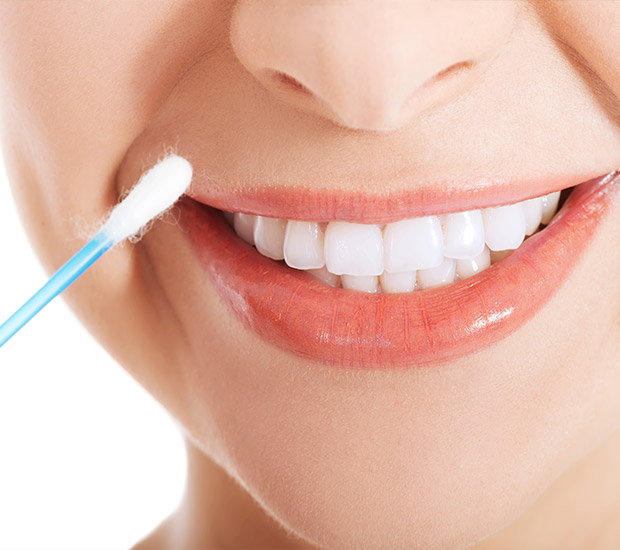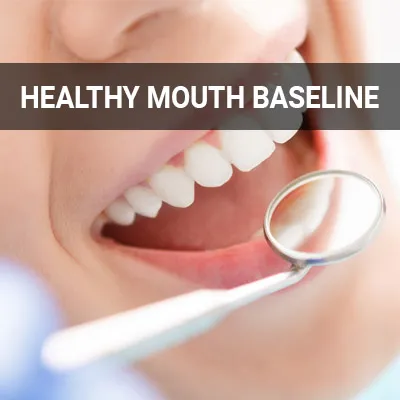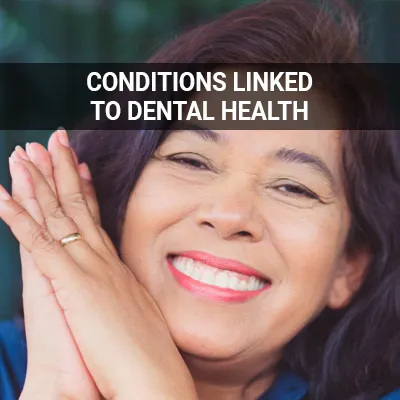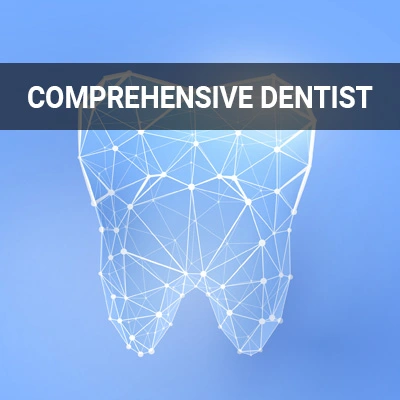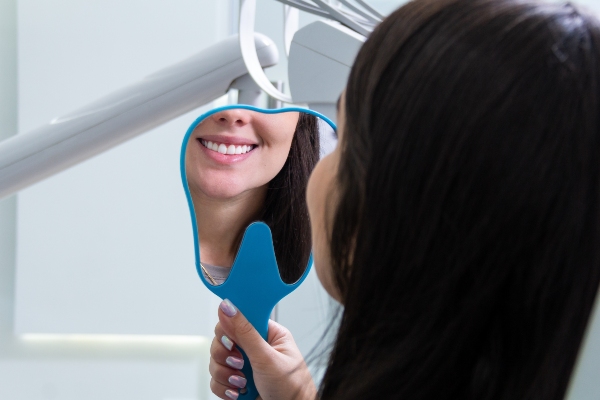OralDNA Diagnostic Test San Ramon, CA
OralDNA® diagnostic testing, or dental saliva testing, can help patients learn more about their health needs. It is frequently an ideal alternative for patients who are uncomfortable with blood testing. OralDNA is a promising, emerging form of diagnostic testing that is slowly revolutionizing dentistry.
OralDNA testing is available at Aaria Dental in San Ramon and the surrounding area. We can help you fulfill your various salivary diagnostics needs. Call us today at (925) 967-2444 to schedule an appointment or to learn more about our services.
Bio Components Detected in Test
The OralDNA test will look for specific bio-components found in saliva. These bio-components can include proteins, electrolytes, hormones, antibodies, and DNA/RNA. A variety of tests will identify specific microorganisms and inflammatory factors to discover if someone is at high risk for specific oral health issues such as gum disease and human papillomavirus (HPV). A person's bacterial levels can also be determined. With this information, our dentist will better understand a patient's overall dental health and what oral health issues they may face in the future.
“The OralDNA Test will look for specific bio components found in saliva.”
OralDNA and Disease Detection
OralDNA diagnostic testing can detect a variety of diseases, including:
- Chlamydia trachomatis and Neisseria gonorrhea in the oropharynx
- Herpes simplex virus in the oropharynx, types 1 and 2
- HPV-related oral cancers
- Novel coronavirus
- Yeast infections
It can also assess a patient's risk for periodontal infections, development of cavities, and HPV-related oral cancers. Additionally, OralDNA testing can identify early warning signs of oral pathogens and analyze gene markers concerning inflammatory responses. None of these tests are more complicated than having the patient provide a simple oral rinse collection.
Patients can also choose to undergo Alert 2™, a diagnostic test for both gum disease-causing oral pathogens and inherited genetic risk. Dentists can use these results to create the best treatment plan tailor-made for the patient's unique and individual needs. These results may also assist dentists in identifying any potential related systemic health risks.
“… OralDNA testing can identify early warning signs of oral pathogens and analyze gene markers concerning inflammatory responses.”
How OralDNA Testing Works
OralDNA testing is a quick and painless procedure that requires minimal effort on behalf of the patient. Sample collection requires the patient to swish and gargle a 5mL saline solution vigorously for 30 seconds, then spit it into the funneled collection tube. Our team will then open the preservative vial and pour the sample into the collection tube before preparing it to be sent off to the laboratory.
Like all salivary diagnostic testing, OralDNA diagnostic testing analyzes the secretions from the major and minor salivary glands, oro-nasopharyngeal secretions, gingival crevicular fluid, and cellular debris. Saliva contains all of these, along with antibodies, enzymes, growth factors, hormones, microbes, and their products. Many of these enter saliva through the blood. As such, saliva can be considered a reflection of the body's physiological functionality.
“OralDNA testing is a quick and painless procedure that requires minimal effort on behalf of the patient.”
Check out what others are saying about our dental services on Yelp: OralDNA Diagnostic Test in San Ramon, CA
DNA and Your Future Health
OralDNA tests can tell a dentist whether or not a patient is genetically predisposed toward inflammation. This can help explain why some patients continue to have gum disease even after complying with traditional treatment methods. While a patient's DNA cannot be changed, just knowing that they may have an overactive inflammatory response can help the dentist understand the need for more constant care or other types of therapies.
This information is also helpful when it comes to the patient's overall well-being. Increased inflammation can contribute to an extensive list of chronic systemic diseases related to gum disease, including heart attack, stroke, and diabetes. Our dentist will recommend the patient work with their primary care physician to address these potential medical issues.
“OralDNA tests can tell a dentist whether or not a patient is genetically predisposed toward inflammation.”
Questions Answered on This Page
Q. What diseases can be detected by OralDNA testing?
Q. How does OralDNA testing work?
Q. What are the bio-components detected in the OralDNA test?
Q. How does an OralDNA test predict your future health?
Q. How are results interpreted?
People Also Ask
Q. How does oral health affect overall health?
Q. What is the process of recognizing issues and creating a plan?
Q. Why is preventative care important?
Q. What family members may need extra help with their oral hygiene?
Results Interpretation
Once a patient's results are back from the lab, our dentist will see what they say about their oral health. The results will include what and how many biomarkers were detected, the risk level involved, and treatment suggestions. This can include an antibiotic targeted to the type of bacterial profile detected in the results. OralDNA tests can help verify clinical oral diagnoses and further explore other conditions related to gum disease or oral infection.
“Once a patient’s results are back from the lab, our dentist will see what they say about their oral health.”
Frequently Asked Questions
Q. How can an OralDNA test help with treating gum disease?
A. Eleven different types of bacteria in the mouth can cause gum disease. An OralDNA test helps identify which strain of bacteria is causing your problems. A treatment designed to target that bacteria can then be administered.
Q. How is an OralDNA test done?
A. A dental saliva test is quite easy and painless. The patient will swish a saline solution around the mouth and then spit it into a tube. That tube is then sent to the lab for processing. Results and recommended treatments are then sent back to our office.
Q. Can a dental saliva test impact my overall health?
A. The OralDNA test can tell our dentist if you either have or are at higher risk for gum disease and other types of oral bacteria. That means treatment can start sooner. Leaving these conditions untreated can put you at higher risk for other health issues such as heart disease, diabetes, and stroke.
Q. Why should my saliva be tested for HPV?
A. Human papillomavirus (HPV) is one of the most common virus groups. Specific types of oral HPV can increase your risk for certain oral cancers. A saliva test can show whether or not these strains are present and if you should increase the frequency of your oral cancer screenings.
Q. What is involved in an oral cancer screening?
A. A dentist looks inside your mouth for possible signs of oral cancer, including red or white patches or sores. While wearing gloves, the dentist will feel inside your mouth for lumps. The dentist may also check your neck for abnormalities. The exam is usually short and takes about 5 minutes.
Dental Terminology
Call Us Today
Dental saliva tests can help many patients better understand themselves and their needs. We at Aaria Dental may be able to help. Call us today at 925-967-2444 to schedule an appointment or to learn more about our services.
Helpful Related Links
- American Dental Association (ADA). Glossary of Dental Clinical Terms. 2025
About our business and website security
- Aaria Dental was established in 2023.
- We accept the following payment methods: American Express, Cash, Check, Discover, MasterCard, and Visa
- We serve patients from the following counties: Contra Costa County
- We serve patients from the following cities: San Ramon, Norris Canyon, Danville, Blackhawk, and Dublin
- Norton Safe Web. View Details
- Trend Micro Site Safety Center. View Details
Back to top of OralDNA Diagnostic Test
